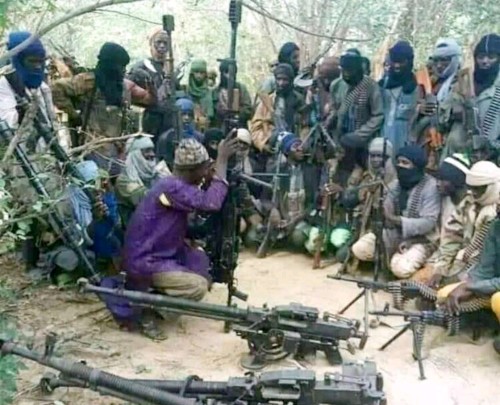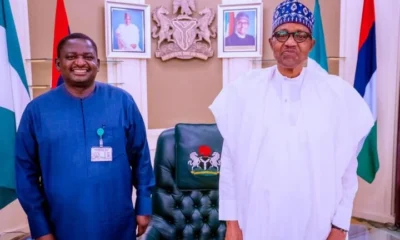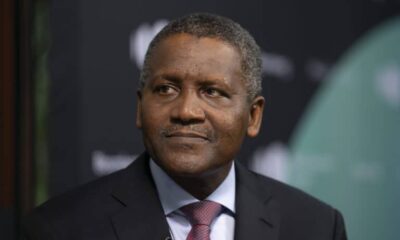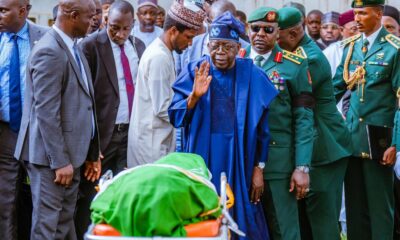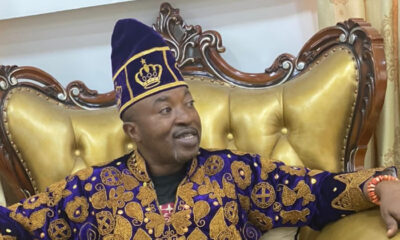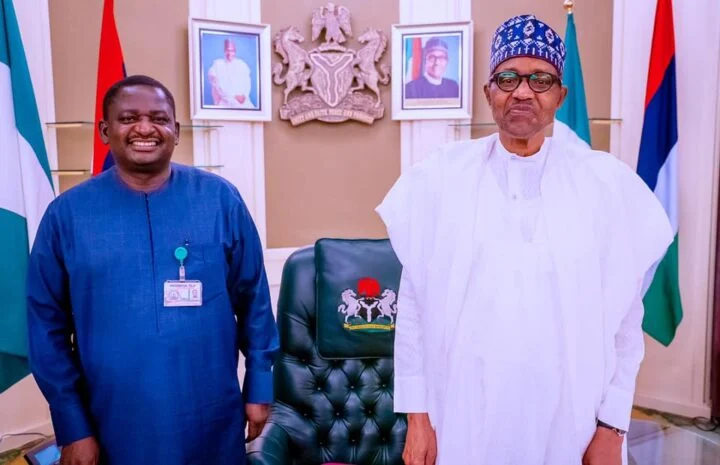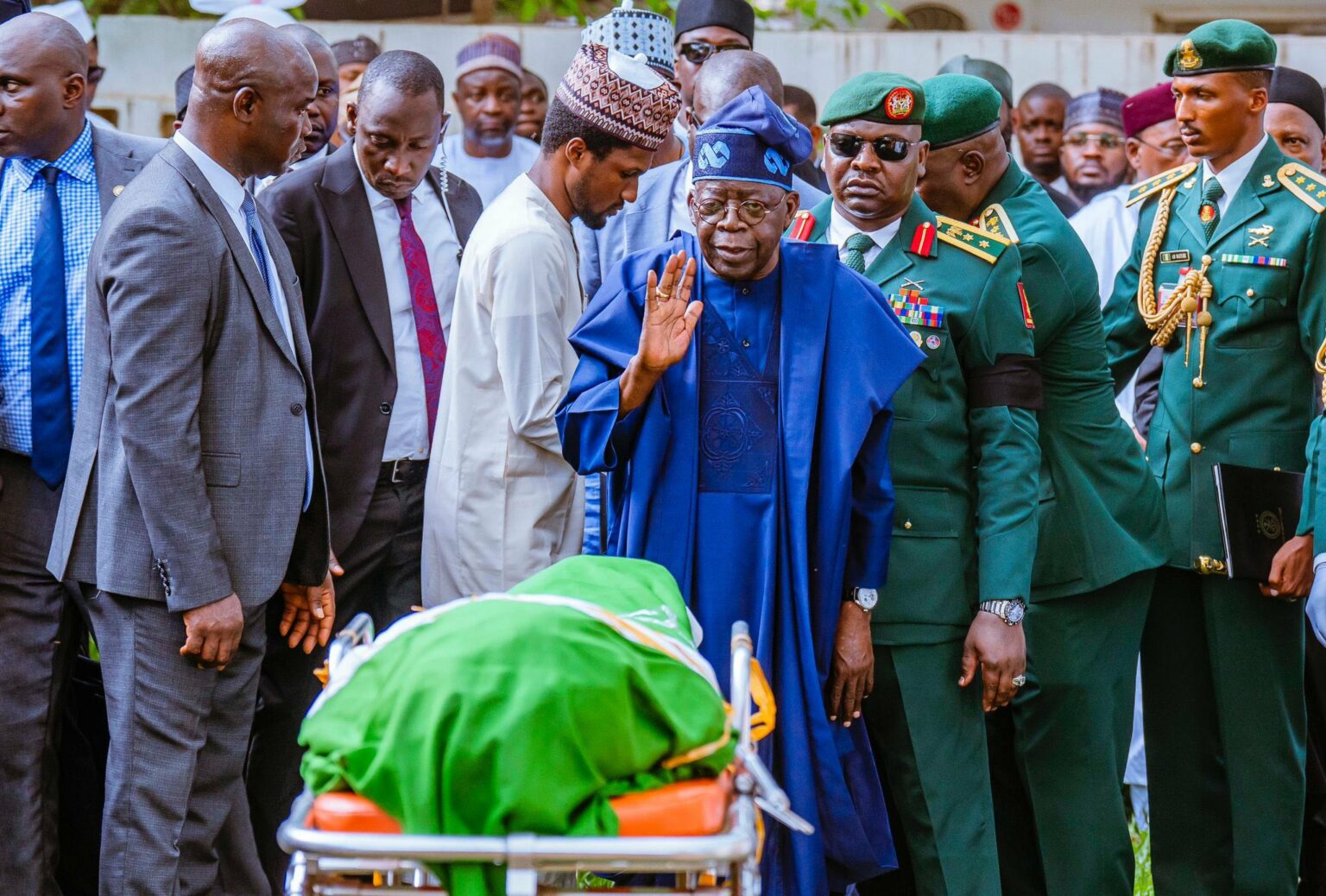President Bola Tinubu and Vice President Kashim Shettima led a distinguished group of Nigerian elites, including ex-presidents, to Daura, Katsina State, on Tuesday to honour the late military ruler and two-time civilian President, Muhammadu Buhari, as he was laid to rest.
Tinubu welcomed Buhari’s casket, wrapped in the national flag, at Umaru Musa Yar’Adua International Airport in Katsina shortly after 2 p.m. The coffin had arrived from London that morning aboard the Presidential Aircraft, the same jet Buhari used during his time in office.
The Chief Imam of Daura, Sheikh Salisu Rabiu, performed the Islamic funeral rites, with dignitaries in attendance, including President Umaru Sissoci Embaló of Guinea-Bissau, Niger Republic’s Prime Minister, Ali Zeine, and former Nigerien President, Issoufou Mahamadou.
Former Vice Presidents Yemi Osinbajo and Atiku Abubakar attended the ceremony, alongside legislative leaders such as Senate President Godswill Akpabio, House Speaker Tajudeen Abbas, Deputy Senate President Barau Jibrin, and Senators Kawu Sumaila, Abdulaziz Yari, Sani Bello, Abu Ibrahim, and Yariman Bakura.
Top military officials present included Chief of Defence Staff General Christopher Musa, Chief of Army Staff Lt. Gen Olufemi Oluyede, Inspector General of Police Kayode Egbetokun, Chief of Naval Staff Vice Admiral Emmanuel Ogalla, retired Chief of Defence Staff Lt. Gen Tukur Buratai, and ex-DSS Director General Yusuf Bichi.
Leading the Katsina delegation was Governor Dikko Radda, who was joined by Deputy Governor Faruq Jobe, State House of Assembly Speaker Nasir Daura, Secretary to the State Government Abdullahi Faskari, and members of the State Executive Council.
Representing the federal government were Senior Special Assistant to the President on Political and Other Matters Ibrahim Masari, Minister of State for Health and Social Welfare Dr. Isiaq Salako, and Housing and Urban Development Minister Ahmed Dangiwa.
Other top officials present included Information and National Orientation Minister Mohammed Idris, Budget and Economic Planning Minister Atiku Bagudu, Minister of State for Defence Bello Matawalle, Agriculture Minister Abubakar Kyari, former Communications Minister Dr. Isa Pantami, and ex-Attorney General Abubakar Malami.
Also present were the Chairman of the Nigeria Governors’ Forum and Kwara State Governor AbdulRahman AbdulRazaq, as well as governors from Bauchi, Yobe, Kano, Kaduna, Nasarawa, Gombe, Jigawa, Kebbi, Zamfara, Sokoto, and Lagos States.
Governors from Ogun, Edo, Imo, and Cross River States—Dapo Abiodun, Monday Okpebholo, Hope Uzodimma, and Bassey Otu—were in attendance as well.
Former governors Ibrahim Shema (Katsina), Ali Modu Sheriff (Borno), Nasir El-Rufai (Kaduna), Aminu Tambuwal (Sokoto), and Yahaya Bello (Kogi) were among the dignitaries at the event.
Prominent business figures like Aliko Dangote, Sayyu Dantata, and Dahiru Mangal were present. Traditional rulers including the Emir of Katsina Abdulmumini Usman, Emir of Daura Umar Faruq, and Emir of Kano Aminu Ado Bayero also attended.
Also in the crowd were Senator Abubakar Kyari, Dr. Isa Ali Pantami, Abubakar Malami, and Seyi Tinubu, the President’s son.
According to the Nigerian Airspace Management Agency, the influx of high-profile guests to Daura led to over 130 aircraft movements at Katsina airport between Monday and Tuesday.
President Tinubu touched down in Katsina at 1:42 p.m., reviewed a guard of honour, and shortly after, the aircraft carrying Buhari’s remains arrived at 1:51 p.m.
Buhari died on Sunday, July 13, 2025, in a London hospital.
Accompanying his body back to Nigeria were Vice President Shettima, Chief of Staff Femi Gbajabiamila, his wife Aisha, and other relatives.
Tinubu, Shettima, President Embaló, Prime Minister Zeine, former President Mahamadou, and former VP Osinbajo received Buhari’s coffin at the foot of the plane.
A joint military team of nine high-ranking officers placed the casket on a trolley. The officers included Major-Generals Mohammed Usman, Oluwafemi Williams, Shuaibu Nuhu; Rear Admirals Suleiman Dahun, Jonathan Ajodo, Samuel Ngatuwa; and Air Vice Marshals Adeniyi Herbert Amesinlola, Idi Sanni, and Obinna Obiabaka. Major General Mike Alechenu coordinated the unit.
As a hymn, “God Be With You Till We Meet Again,” played, the officers slowly wheeled the casket past a military honour guard composed of six officers and 96 troops from the armed forces.
Tinubu and other top dignitaries followed behind in a slow, solemn procession. The casket was then placed in a military hearse for the trip to Daura for prayers and burial.
At the PMB Helicopter Ground in Daura, thousands gathered in a highly emotional moment to say their goodbyes to the former president.
Prayers were offered to Almighty Allah for his forgiveness and eternal rest in Aljannatul Firdaus, while also asking for strength for his family, the people of Daura, and Nigerians grieving this national loss.
The state burial was marked by full military honours, including a 21-gun salute.
Following the Janazah prayer, Buhari was interred at his Daura home as large numbers gathered to honour him.
His last journey began Tuesday afternoon when his body landed in Katsina from London.
President Tinubu, Vice President Shettima, President Embalo, Prime Minister Zeine, former President Mahamadou, and former VP Osinbajo, along with state governors and business leaders, escorted the late President on the drive to Daura.
The interment was witnessed at 5:50 p.m. by Tinubu and Buhari’s family members.
Tributes have been pouring in, particularly from female members of Buhari’s former cabinet. One of them, Dr. Rabi’atu Aliyu, ex-Minister of State for the Federal Capital Territory, described Buhari as “a man who was honest, resilient, enduring and tolerant.”
In her tribute, she wrote, “I was privileged to serve under the late President Muhammadu Buhari. He was like a father to me. Our relationship dates back to before my appointment — I was a friend to his first daughter, and through that, I became a part of his family. He is the father of Noor.”
“It takes a special kind of leader — even as a former military man — to be so detribalised, astute, simple, and honest in a way I have never seen before. President Buhari was known for appointing people based on merit, not ethnicity or personal ties. His household was a reflection of Nigeria: you would find Igbo, Yoruba, and others. I am from the Kakanda tribe in Lokoja, Kogi State, and yet, I feel this loss deeply, as if I just lost my own father.”
“That says a lot about the kind of man he was: honest, resilient, enduring and tolerant. May God grant us all the strength to bear this great loss.”
Sadiya Farouq, former Minister of Humanitarian Affairs and Disaster Management, said she mourned a father.
Farouq wrote, “His passing is a great loss, a huge vacuum has been left. We have truly lost a father, a leader, a patriot, and a nationalist. The people of this country are deeply mourning this profound loss as I speak, but Allah loves him more. We pray to Almighty Allah to accept him into Jannatul Firdausi.”
“Baba was a father, a leader, and a mentor, someone who gave everyone the opportunity to realise their dreams and aspirations without expecting favours or guarantees. He was loved and respected by all. He took pride in his team and upheld discipline and patriotism. I am very proud to have been part of his administration. He was a father, a mentor, and a true leader.”
“Nigerians should emulate his legacy. As I mentioned, he was a good man, a patriot, a humble and disciplined individual, and a deeply patriotic Nigerian. The people of this country should continue to pray for him. We have lost a pillar, especially for the poor and vulnerable citizens of this nation, whom he always held close to his heart.”
Pauline Tallen, who served as Minister of Women Affairs, remembered Buhari as someone who valued humility and understood life’s fleeting nature.
Tallen said, “I feel heavy. I feel I have lost a father, a leader, and a mentor. He was my leader, my President, and I looked up to him as a father figure. So, to me, he was not just a leader or a president — he was like a father. He embodied patience, humility, selflessness, and simplicity. He was not materialistic; he understood the vanity of life. He came into this world empty-handed and will return the same way.”
“Look at his life — he was once a military head of state, a minister of petroleum, and then served as President for eight years, yet he remained humble and content. You can see humility reflected in everything around him, including his home. I pray other leaders will learn from his virtues.”
Rotimi Amaechi, former Minister of Transportation, said Buhari’s death hit him personally.
Amaechi said, “It’s a personal loss, not only because I am a title holder in Daura, but because I served in government, in Nigeria.”
“And I watched him make contributions to democracy. It’s a very personal loss. He was a very principled man, disciplined, and selfless.”
Dr. Aliyu Audu, a former Senior Special Assistant to President Tinubu on Public Affairs, described Buhari as a symbol of integrity.
Reflecting on Buhari’s presidency, Audu said, “I’m here to commiserate with the family. Buhari was a man of integrity. He lived a very modest life, and as you can see, we are gathered here in his humble home. He truly did his best for Nigeria.”
“Buhari was a bright star of Nigeria who served the country with deep commitment…I am here to honour his legacy and to express heartfelt condolences to his family,” he said.
A Presidential Committee will visit Buhari’s family later on Tuesday as part of the weeklong tribute activities.
Credit: The Punch

 BIG STORY5 days ago
BIG STORY5 days ago
 BIG STORY5 days ago
BIG STORY5 days ago
 BIG STORY2 days ago
BIG STORY2 days ago
 BIG STORY18 hours ago
BIG STORY18 hours ago
 BIG STORY2 days ago
BIG STORY2 days ago
 BIG STORY4 days ago
BIG STORY4 days ago
 BIG STORY2 days ago
BIG STORY2 days ago
 BIG STORY19 hours ago
BIG STORY19 hours ago




